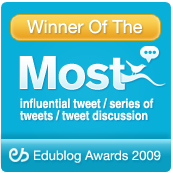The latest trend in education may be to shift teaching and learning from the classroom to the internet. We are seeing more and more states tuning to this as an answer to their education woes. Colleges have been transitioning in that direction for years. Online course have exploded over the years. I served on a committee for the New York State United Teachers examining those online possibilities for the secondary level back in the turn of the century, about the year 2000.
My personal experience with online learning, beyond the theoretical, came with my daughter as an eighth grader participating in an online-writing program sponsored by Johns Hopkins University. This occurred in 2007. I have two daughters and they have grown up in a technology-rich home environment. We are most fortunate and are thankful every day for what we have. The experience of my kids however, is probably not typical for every kid in America. That experience is what my daughter brought to the table as her preparation for this writing program.
Two things impressed me about this program. First, I was intrigued with the approach and methodology of the teacher .It was not assignments and worksheets, but rather explorations and feedback. Second, I witnessed how effective it was in engaging and advancing my daughter in writing. Of course the obvious, to be stated, is that if it were not for the first, the second would never have resulted. It was obvious that the educator on the other side of the computer screen was trained and experienced in delivering more than material and worksheets to spark more than just involvement on my daughter’s part. She was participating with interest. As a “classroom teacher”, I was most impressed. As a father, I was very proud of my daughter’s accomplishments. As an educator, I began to think, is this the way to go?
Stepping back into the “Wayback Machine” and returning to today, I need to ask many more questions. There are many who see this as a silver bullet for education. It addresses the concerns of politicians and business people. Online learning can be cheaper and more cost-effective than classroom teaching. They foresee one educator reaching larger numbers of students than could be done with conventional teaching methods. Less overhead, more profit, lower taxes. With the Kahn Academy and the popularity of the TED Talk Lectures how can online learning miss the mark? It is the one stop answer many have been looking for. That would be the many who are not educators, but seem to direct the reform discussions.
If we are to travel the path to online learning, we need people to lead the way. Most colleges are preparing teachers for classroom teaching. Technology itself has found it difficult to break into the teacher preparation mindset. The idea that a teacher can teach solely over the internet, or even for part of the day, has not yet been accepted by many of those who teach teachers. The blended classroom may be happening, but it is through pioneering and not engineering. We need more than a workshop to train teachers to teach over the internet.
The idea of the blended class on the secondary level, which is far less a goal than complete immersion into online learning, cannot depend on happening with just students coming from colleges as new teachers. With over 7 million teachers in the United States we can’t expect that all of them have the ability or inclination to self-teach themselves the skills necessary to support an online teaching initiative.
The other big obstacle to this online learning is the same thing that is an obstacle to conventional education that we continue to ignore, poverty. There are families that are not financially capable of supporting that which is necessary for online learning. They do not have the bandwidth metaphorically or literally to do this.
I also question the ability of the students to be prepared for such a change. Being educated in an environment that at best has mixed feelings about technology in education, are our students properly versed in, not only the skills needed, but the mindset required for online learning? We have schools that still ban the internet. We have teachers who will not give up the chalk board. We still budget for overhead projectors and textbooks. These are not bad things. They are however indicators that we may not yet be prepared for immersion into online education. As always, the use of technology for the sake of using technology in an education setting is doomed for failure.
As an adult, I am all for online learning. Adults however, learn differently than children. As an educator I support the use of technology as a tool for learning. I would use it anywhere that it fits into what I teach and how I teach it. I believe we need to teach our students for the lives they will be living, which is not the same as the lives led by us, their teachers. I believe we must move forward to stay relevant. None of this can be successful however without the proper preparation.
The agenda for online learning may be misguided by people whose motivations are guided less by quality education and more by cutting costs and taxes, or, in the case of private schooling, to increase profits. Online learning, to be done properly, will require educating the educators, and providing the poor with that which they must have to participate in education. Students will also have to be provided the skills to participate in the process. Colleges will need to prepare teachers differently. Oh, and here is the elephant in the room. Who stays home with the kids as they are receiving their online education?
If we are going to go in the direction of online learning, than we must prepare for it. I think if we do so, it may change not only the way we teach, but it will affect the way everyone learns. It cannot be done on the cheap. Professional development in our system is, and continues to be the weak link of education. We cannot again add-on something else without training and supporting those who must use it, and then blaming them when it ultimately fails. There are so many unanswered questions. Even as we answer the questions however, we must keep in mind, that there is no single answer. There is no silver bullet.











